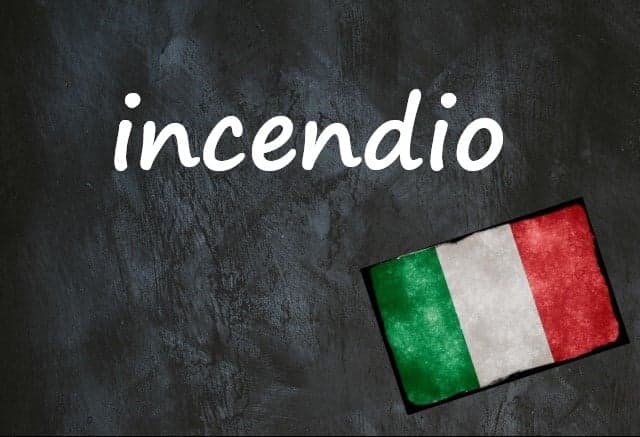Italian word of the day: 'Incendio'

Do you have a burning need to know how to use this word correctly?
One Italian word most learners are familiar with is fuoco - fire. It’s easy to remember, and used in many of the same contexts as the English equivalent.
But you may have noticed another word, particularly when reading about the wildfires wreaking havoc in Italy at the moment: incendio.
You can probably have a good guess at meaning of this word. After all, it reminds us of the English word incendiary, which has the same Latin root.
Both fuoco and incendio effectively mean the same thing: ‘fire’. But confusion arises from the fact that they can’t always be used interchangeably.
So what exactly is the difference?
Simply put, fuoco tends to be used to refer to the element; while incendio is used when something is on fire.
Le eruzioni vulcaniche e gli incendi continueranno
The volcanic eruptions and fires continue
Where English-language news reports would use the word 'blaze', Italian news would opt for incendio.
A wildfire or forest fire might also be called an incendio forestale or incendio nel bosco.
L’incendio forestale continua ad imperversare.
The forest fire continues to rage on.
Fuoco is used more widely to talk about fire in general.
For example, fireworks are fuochi d'artificio (literally: ‘artificial fires’) and firefighters are vigili del fuoco (literally: ‘fire guards’) - a Roman-era term reintroduced under Mussolini’s rule, as the dictator is said to have preferred it to pompieri as they were previously called (and still are in some parts of the country).
One everday usage is when talking about the heat used while cooking: fuoco basso/alto (low/high heat).
Bisogna friggere le cipolle a fuoco basso
You need to fry the onions on a low heat
And Italian has plenty of fire-related idioms, which you may or may not be able to guess the meanings of.
For example: fare fuoco e fiamme literally means 'to make fire and flames': it's used to talk about someone really losing their temper, where in English we might 'go ballistic' or 'raise hell'.
Slightly less dramatically, a hectic day might also be described as una giornata di fuoco, or 'a day of fire'.
Do you have a favourite Italian word you’d like us to feature? If so, please email us with your suggestion.
Don't miss any of our Italian words and expressions of the day: download our new app (available on Apple and Android) and then select the Italian Word of the Day in your Notification options via the User button.
Comments
See Also
One Italian word most learners are familiar with is fuoco - fire. It’s easy to remember, and used in many of the same contexts as the English equivalent.
But you may have noticed another word, particularly when reading about the wildfires wreaking havoc in Italy at the moment: incendio.
You can probably have a good guess at meaning of this word. After all, it reminds us of the English word incendiary, which has the same Latin root.
Both fuoco and incendio effectively mean the same thing: ‘fire’. But confusion arises from the fact that they can’t always be used interchangeably.
So what exactly is the difference?
Simply put, fuoco tends to be used to refer to the element; while incendio is used when something is on fire.
Le eruzioni vulcaniche e gli incendi continueranno
The volcanic eruptions and fires continue
Where English-language news reports would use the word 'blaze', Italian news would opt for incendio.
A wildfire or forest fire might also be called an incendio forestale or incendio nel bosco.
L’incendio forestale continua ad imperversare.
The forest fire continues to rage on.
Fuoco is used more widely to talk about fire in general.
For example, fireworks are fuochi d'artificio (literally: ‘artificial fires’) and firefighters are vigili del fuoco (literally: ‘fire guards’) - a Roman-era term reintroduced under Mussolini’s rule, as the dictator is said to have preferred it to pompieri as they were previously called (and still are in some parts of the country).
One everday usage is when talking about the heat used while cooking: fuoco basso/alto (low/high heat).
Bisogna friggere le cipolle a fuoco basso
You need to fry the onions on a low heat
And Italian has plenty of fire-related idioms, which you may or may not be able to guess the meanings of.
For example: fare fuoco e fiamme literally means 'to make fire and flames': it's used to talk about someone really losing their temper, where in English we might 'go ballistic' or 'raise hell'.
Slightly less dramatically, a hectic day might also be described as una giornata di fuoco, or 'a day of fire'.
Do you have a favourite Italian word you’d like us to feature? If so, please email us with your suggestion.
Don't miss any of our Italian words and expressions of the day: download our new app (available on Apple and Android) and then select the Italian Word of the Day in your Notification options via the User button.

Join the conversation in our comments section below. Share your own views and experience and if you have a question or suggestion for our journalists then email us at [email protected].
Please keep comments civil, constructive and on topic – and make sure to read our terms of use before getting involved.
Please log in here to leave a comment.